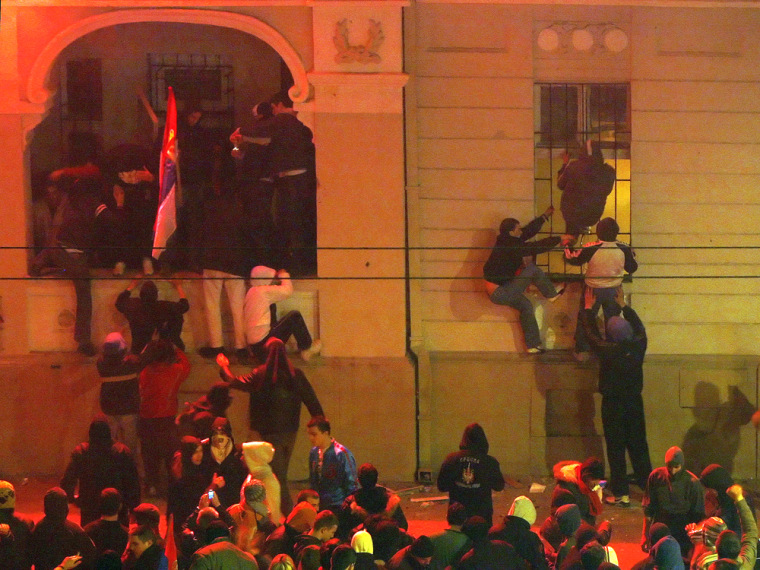The State Department on Friday ordered nonessential diplomats and the families of all American personnel at the U.S. Embassy in Belgrade to leave Serbia, following an attack on the compound.
The move, made at the request of U.S. Ambassador to Serbia Cameron Munter, came as U.S. diplomats across the Balkans went on alert, girding for more anti-American violence after Serb rioters stormed and torched the Belgrade embassy Thursday, causing as-yet undetermined damage and drawing fierce condemnation from Washington.
"We are not sufficiently confident that they are safe here," Munter said in an interview in Belgrade.
A State Department official said 14 embassy employees were on the site when a mob attacked but that all American and local staff are safe. The charred body of one person found in the compound is believed to be that of a protester, spokesman Sean McCormack said.
Protests over the declaration of independence by the former Serbian province of Kosovo have increased tensions across the region. And new mass demonstrations are expected following recognition of Kosovo by the United States and other Western countries.
On Friday, Serbs used stones, glass bottles and firecrackers to attack U.N. police guarding a key bridge in northern Kosovo.
U.S. diplomat Nicholas Burns called on Serbia's main ally, Russia, to repudiate a suggestion by one of its officials that it may need to use military force to earn respect after the U.S. and other countries recognized the independence of Kosovo, which is mainly ethnic Albanian, over strong Serb and Russian protests.
"We strongly advise Russia to be more responsible in its public comments toward Kosovo," Burns said, responding to questions in an online written discussion. "Russia is isolated this week -- very few countries are supporting its position."
Earlier, Russia's envoy to NATO Dmitry Rogozin said the move to recognize was Kosovo a "strategic mistake" and suggested that Moscow might "have to use brute military force" if the alliance expands its current peacekeeping operation in the territory.
The U.S. State Department said the lack of protection for its mission — police were absent when Thursday's attack began — was intolerable and demanded a response from the U.N. Security Council.
“The members of the Security Council condemn in the strongest terms the mob attacks against embassies in Belgrade, which have resulted in damage to embassy premises and have endangered diplomatic personnel,” the 15-member body said in a unanimous statement late on Thursday.
Embarrassed, Serbia said it regretted what it called acts of isolated vandals who did not represent a nation which, while bitter at Kosovo’s declaration of independence on Sunday, did not want further violence.
'Absolutely unacceptable'
“The acts that were committed are absolutely unacceptable, absolutely regrettable,” Foreign Minister Vuk Jeremic told Reuters in an interview. “They hurt Serbia’s image abroad.”
Germany, Croatia and Britain also said their missions were vandalized. Local media added Bosnia’s and Turkey’s to the list.
Some 200,000 people attended the state-backed rally. Jeremic said police were overwhelmed by what was Serbia’s biggest march since protesters stormed the old Yugoslav parliament building in 2000 to oust nationalist leader Slobodan Milosevic.
But police were nowhere to be seen when just a few score of rioters — many wearing balaclavas — attacked the U.S. embassy for the second time in a week.
As a crowd of about 1,000 cheered “Serbia, Serbia,” one protester ripped the Stars and Stripes off its pole and others jumped up and down on a balcony, holding a Serb flag. Smoke billowed out of the embassy as papers and chairs were thrown out of windows and burning doors were wedged in the frames.
American officials said only security personnel were at the embassy at the time, in a different area.
Condemnation
Riot police arrived later and fired teargas to disperse the crowds. A charred body was later found inside, probably of a protester; the embassy said its U.S. staff were accounted for and Marines protecting it had not engaged in any fighting.
Hospital officials said around 150 people were injured in street clashes, including 30 police and some journalists.
The Security Council said a 1961 Vienna Convention obliged host governments to protect embassies, but also welcomed steps taken by the Serbian authorities to restore order.
The council has been a battleground over Kosovo, with Russia refusing to accept Western moves to legitimize the mainly Albanian region’s independence after nine years as a U.N. ward.
EU split on Kosovo
The EU remains split, with members Slovakia, Spain, Cyprus, and Romania refusing to recognize Kosovo over concerns it might set a legal precedent or issues with minority rights.
Venezuelan President Hugo Chavez, a strong critic of U.S. foreign policy, said Caracas would refuse to recognize Kosovo’s independence, calling it dangerous U.S. meddling.
Serbia considers Kosovo its historic heartland and waged a diplomatic campaign against its secession on Sunday.
“As long as we live, Kosovo is Serbia,” Prime Minister Vojislav Kostunica had told the state rally, where Serbs of all ages listened to speeches and melancholic patriotic songs about Kosovo, seen as the birthplace of a proud medieval kingdom.
Washington said Kostunica later pledged there would be no repeat of the attacks, but analyst Jon Levy of the Europe and Eurasia think tank said tension would remain: “Additional acts of what is effectively political vandalism can be expected.”
The Belgrade rioters also looted and vandalized shops and banks, especially Western ones, leaving a trail of debris.
